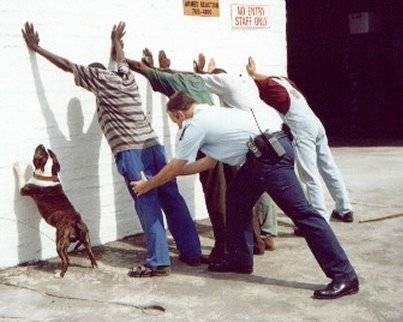The choices that they made in the past has affected their lives from living in the "Norm" of society

Description: Criminal Marginalization
Image copyright: http://www.sbtfun.com/files/criminal_spread_em.jpg
Many people believe that all convicts are corrupted and distraught so the thought of them returning to school and furthering their education is unlikely. Over time this idea certainly has become less and less likely for a couple of particular reasons. The Higher Education Act of 1998 bars ex-felons from eligibility for Pell Grants, the largest type of federal student loans. Laws also restrict ex-felons from working with minors so that excludes many schools. Without all the opportunities that everyone else has how are ex-felons able to achieve their academic goals in life on top of their discouragement from their past?
Even if an ex-felon were to get a degree what are the chances they would be hired? Many people would automatically think that they would have an extremely difficult time searching for an employer that would accept an application or give them the time of day for an interview. After a felon has completed a sentence there are legal barriers that exist that keep them from working in certain fields due to Congress in the part of the “War” on crimes and drugs. These ex-cons are excluded from many jobs especially government jobs, military jobs, and jobs dealing with financial responsibilities. “Although not all hope is lost” says JoAnne Page, president and CEO of Fortune Society, a New York based non-profit society that aides prisoners in their re-entry into the work force. She says “Ex-cons should know the employment laws in the state they are currently a resident of and check the company’s policies on background checks. Many may have to go for a job that they are overqualified for and work their way up into a higher position.” One of the best tactics that Page recommends is to be honest. No beating around the bush here, if the company you are applying for is going to do a background check anyways you might as well try your best to build a trust and show your good work ethic by being honest about your past criminal record. Criminals must be prepared for rejection and be able to handle it in a calm and reasonable manner. However they should not give up hope because there are many organizations such as this one that help ex-cons back on their feet.
If a person knows that another person has a criminal record a natural reaction is to marginalize them or feel unsecure around them especially if they are ex-felons. However, not all are guaranteed to be on a path to relapse in which they will be re-incarcerated. These ex-felons have been in correctional facilities for the entire duration of their sentencing anointed by a judge that felt the time was just. If our society would take this more into consideration they would realized that some people, not all, need to take chances because if nobody does then the cycle starts over again.
